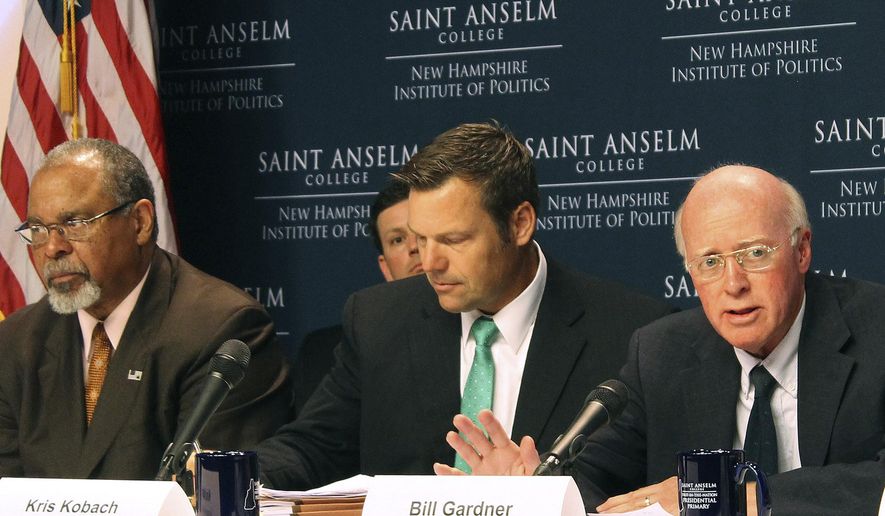OPINION:
Last week President Donald Trump put an end to his commission investigating potential voting irregularities in America. He took to Twitter to blame the lack of cooperation and even direct defiance of many states under the control of Democrats:
Many mostly Democrat States refused to hand over data from the 2016 Election to the Commission On Voter Fraud. They fought hard that the Commission not see their records or methods because they know that many people are voting illegally. System is rigged, must go to Voter I.D.
— Donald J. Trump (@realDonaldTrump) January 4, 2018
But much of the blame for the collapse of the commission appears to have originated from within the ranks of Trump’s own nominees to the blue ribbon panel.
J. Christian Adams, a former Justice Department attorney who served on the Voting Rights Division under President George W. Bush and Barack Obama says Maine Secretary of State Matthew Dunlap (D-ME) “sabotaged” the commission through media leaks and resistance to the president.
“I was on the commission and I can tell you I would send an email to the commissioners and within about less than an hour my email would be being leaked to The Huffington Post,” Adams told me on my radio program Monday on WMAL in Washington DC. “One in particular the Secretary of State of Maine Matthew Dunlap, who simply did not want to commission to do its work. He played the role like Colonel Hogan, you know burrowing out and blowing things up and sabotaging the work of the commission instead of actually trying to address the real issues.”
Here’s the transcript of the entire exchange:
O’Connor: Your reaction to that and why did that happen, and what can be done now?
Adams: Well I was on the commission and I can tell you I would send an email to the commissioners and within about less than an hour my email would be being leaked to The Huffington Post. So, what was going on was there was people from the commission, one in particular the Secretary of State of Maine Matthew Dunlap, who simply did not want to commission to do its work. He played the role like Colonel Hogan, you know burrowing out and blowing things up and sabotaging the work of the commission instead of actually trying to address the real issues.
O’Connor: So, basically what the problem is is that the President attempted to be too non-partisan or bi-partisan on this commission. He brought in too many people who were sabotaging the process.
Adams: Yeah, Hans von Spakovsky, who I know you’ve had on at The Heritage Foundation, wrote an email, a private email, that got leaked to The Huffington Post, saying that if you name certain Democrats to the commission, they’re going to sabotage its work. And he was widely criticized for that very frank assessment, which later turned out to be, if anything, mild compared to what actually happened. You had people on the commission who didn’t think there was voter fraud, who did want anyone asking questions, doing everything they could, including I might add Larry, a commissioner suing the commission himself. The Maine Secretary of State was on the commission and he turned into a plaintiff to sue the commission because he didn’t think he was being included enough.O’Connor: That’s Matt Dunlap from Maine?
Adams: Right..
O’Connor: So you believe, in your opinion, you were on the commission, you observed it close up…you think that Secretary of State Matt Dunlap of the state of Maine basically sabotaged the commission the President put him on?
Adams: There is no question about that. I mean, anyone who was close to the matter, he was sort of on a crusade to satisfy the radical progressives who don’t want any discussion about voter fraud. If you even ask the questions, if you attempt to quantify the problem or do anything about it, these interest groups go completely berserk they lose their mind.
O’Connor: The heck is this guy doing on a voter fraud commission if he goes berserk about any investigation into voter fraud?
Adams: What happened was he just took on the role of the saboteur. He didn’t want anything done. He sued the commission. He disagreed with the premise that there was anything wrong. And that’s how things rolled. So now he doesn’t have a seat at the table where he can throw his food at everyone.
Adams has discovered thousands of non-citizens registered and voting in Pennsylvania and Virginia in recent studies he conducted through the Public Interest Legal Foundation. The latest election in Virginia had multiple state house elections decided by a handful of votes including one in a tie that was decided by a random drawing.
Listen to the entire interview right here:




Please read our comment policy before commenting.